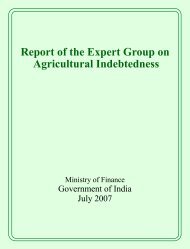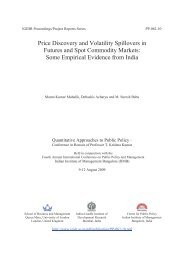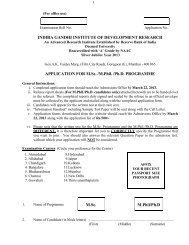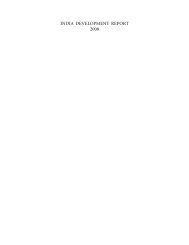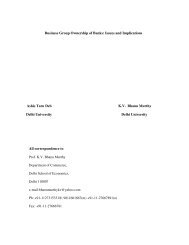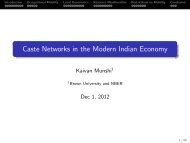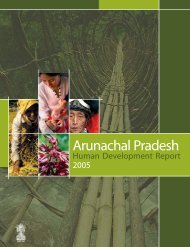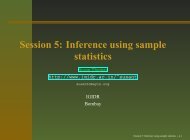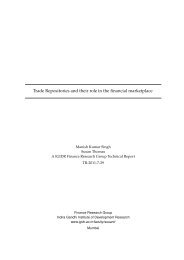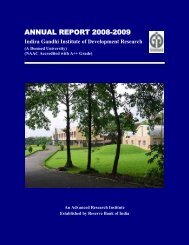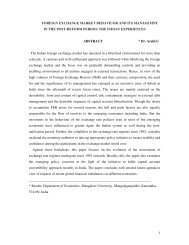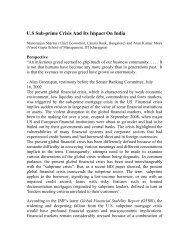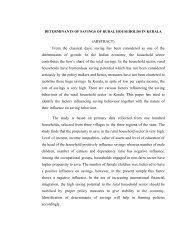Kerala 2005 - of Planning Commission
Kerala 2005 - of Planning Commission
Kerala 2005 - of Planning Commission
Create successful ePaper yourself
Turn your PDF publications into a flip-book with our unique Google optimized e-Paper software.
162<br />
and financial base, some others have a weak financial<br />
base given the limited capacity <strong>of</strong> workers to make<br />
contributions. In some others it has proved difficult to<br />
ensure timely contributions from the employers. There is a<br />
strong case to review the functioning <strong>of</strong> the Welfare Funds<br />
and streamline their functioning and inject a measure <strong>of</strong><br />
pr<strong>of</strong>essional management in investment <strong>of</strong> funds and<br />
delivery <strong>of</strong> benefits. An area that demands particular<br />
attention is that <strong>of</strong> administrative costs which should not<br />
be allowed to exceed the pre-determined level. These<br />
Funds are an example to the rest <strong>of</strong> India in providing a<br />
measure <strong>of</strong> social security to the households <strong>of</strong> workers<br />
in the unorganised sector and thereby help enhance their<br />
human capabilities.<br />
in ostentatious marriages as have been witnessed never<br />
before. A portion <strong>of</strong> the resources spent on these could go<br />
a long way in enhancing the quantity and quality <strong>of</strong> food<br />
provided to poor children in schools. This is something<br />
that the otherwise active civil society has to engage itself<br />
in. With some innovative initiatives, it is quite possible to<br />
realise such goals. This Reports calls on the civil society<br />
to engage in such sensitisation processes.<br />
2.5 Concern for the Voiceless<br />
The problem <strong>of</strong> poverty, especially income poverty,<br />
has been partly tackled by income transfer to specific<br />
vulnerable groups. And one <strong>of</strong> the long-standing schemes<br />
is the provision <strong>of</strong> old age pension to the poor. However,<br />
this scheme requires considerable strengthening. The<br />
monthly pension (Rs. 110 <strong>of</strong> which Rs. 75 is provided<br />
by the Central government under the National Social<br />
Assistance Programme) is too meagre and works out to<br />
less than 30 per cent <strong>of</strong> the per capita income required<br />
to cross the poverty line. Much <strong>of</strong> the social security<br />
content <strong>of</strong> the old age pension for the poor is robbed <strong>of</strong><br />
its worth when such pensions are distributed once in six<br />
or eight months as is the case in <strong>Kerala</strong>. Given the fact<br />
that these poor people have no voice or representation,<br />
there is no one to champion their cause. The State has a<br />
duty to ensure that monthly pensions and similar transfer<br />
payments to the poor are paid on a regular basis without<br />
running into arrears.<br />
2.6 Strengthening Social Security <strong>of</strong> Workers<br />
in the Unorganised Sector<br />
The setting up and institutionalisation <strong>of</strong> Welfare Funds<br />
for workers in the unorganised sector has taken deep roots<br />
in <strong>Kerala</strong>. While some Funds have adequate contributions<br />
2.7 The Need for Innovative Ways<br />
to Strengthen the PDS<br />
For a long time the Public Distribution System played a<br />
pivotal role in ensuring food security in <strong>Kerala</strong>. The PDS<br />
has now undergone some decline arising out <strong>of</strong> the dual<br />
pricing system for Below Poverty Line (BPL) households<br />
and Above Poverty Line (APL) households. If there are<br />
no large-scale social protests or adverse impact arising<br />
out <strong>of</strong> this new system, it is mainly because <strong>of</strong> the easy<br />
availability <strong>of</strong> food grains in the market and the reduced<br />
price differential as between PDS and the open market.<br />
Yet there is a case for strengthening the PDS since<br />
the poor depend on it to a greater extent. The recent<br />
decision <strong>of</strong> the government to permit PDS shops to sell<br />
non-essential commodities is a welcome step in this<br />
direction. A persistent and common complaint is the<br />
low quality <strong>of</strong> food grains distributed through the PDS.<br />
This may be partly taken care <strong>of</strong> by sourcing quality food<br />
grains from other States on a bulk basis that would also act<br />
as a check on prices in the open markets.<br />
2.8 Focus on Enhancing the Quality <strong>of</strong><br />
Education as an Overarching Public Policy<br />
The Report has highlighted that strengthening the virtuous<br />
cycle <strong>of</strong> growth based on human development warrants<br />
addressing the problem <strong>of</strong> quality. As an example, the case<br />
<strong>of</strong> education was discussed in Chapter 6. <strong>Kerala</strong> is ideally<br />
placed now to address the problem <strong>of</strong> quality because <strong>of</strong><br />
the decline in the absolute number <strong>of</strong> children born and<br />
consequent reduction in the school-going population.<br />
Improving the physical amenities in government and<br />
aided schools should continue to receive attention.<br />
The positive role <strong>of</strong> Parent Teacher Associations (now<br />
existent in almost all schools) should be mentioned here



